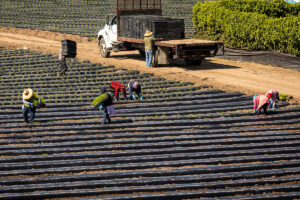A bipartisan group of former leaders of America's major agricultural commodity associations and biofuels organizations, farmer leaders, and former senior USDA officials sent congressional ag leaders a letter on Tuesday…
Judge blocks Biden rule on H-2A workers unionizing
Reuters’ Daniel Wiessner reported Tuesday that “a federal judge in Georgia has blocked the Biden administration from enforcing a rule that bars employers from retaliating against farmworkers who are in the U.S. on temporary H-2A visas and trying to form unions in 17 Republican-led states.”
“U.S. District Judge Lisa Wood in Brunswick, Georgia, said on Monday that the U.S. Department of Labor rule is invalid because Congress explicitly excluded farmworkers from such protections when it granted them to other private-sector workers in the National Labor Relations Act,” Wiessner reported.

Agri-Pulse’s Steve Davies reported that Wood “declined to issue a nationwide injunction, instead tailoring it to apply to the states that brought the complaint and their fellow plaintiffs, Miles Berry Farm in Baxley, Georgia, and the Georgia Fruit and Vegetable Growers Association.”
“The rule conflicts with the National Labor Relations Act and is thus unconstitutional, (Wood) said in her ruling, which prevents the Labor Department from enforcing the regulations in Florida, Georgia, South Carolina, Louisiana, Arkansas, Kansas, Idaho, Indiana, Iowa, Missouri, Montana, Nebraska, North Dakota, Oklahoma, Tennessee, Texas, and Virginia,” Davies reported.
What the Rule Said
Wiessner reported that “the rule adopted earlier this year, bars retaliation against H-2A workers who engage in concerted activity, including union organizing. The NLRA grants those protections to most other private-sector employees, but not farmworkers.”
“The department and supporters of the rule have said it is necessary to address the exploitation of H-2A holders by some businesses,” Wiessner reported. “Many foreign workers are housed in cramped, unsanitary conditions and subjected to sexual and racial harassment and wage theft, according to the department.”
“Agricultural businesses in the U.S. have come to rely increasingly on temporary immigrant workers to perform seasonal work,” Wiessner reported. “The Labor Department issued nearly 300,000 H-2A visas in fiscal year 2022, up from fewer than 60,000 a decade earlier.”
What the Judge Decided
Davies reported that Wood said that “the issue … is whether the final rule creates a right not previously bestowed by Congress. The court finds it does so. Regardless of the terminology used in the final rule — be it collective bargaining or otherwise — the final rule provides for agricultural workers’ right to participate in concerted activity to further their interests. That is a right that Congress has not created by statute.”
“‘The court finds that, by implementing the final rule, the [department] has exceeded the general authority constitutionally afforded to agencies. ‘Agencies may play the sorcerer’s apprentice but not the sorcerer himself,’ she said, quoting a 2001 Supreme Court decision,” according to Davies’ reporting. “’The final rule is an attempt by the DOL to play the sorcerer. The DOL may assist Congress, but may not become Congress.’”
“The plaintiffs met other requirements for issuing a preliminary injunction: They are both likely to succeed and have demonstrated that they will suffer irreparable harm, the judge found,” Davies reported.
Industry Reaction
FERN’s Ag Insider reported that “the National Council of Agricultural Employers said the injunction was a victory for U.S. farmers and ranchers.”
Davies reported that Chris Butts, executive vice president for the Georgia Fruit and Vegetable Growers Association, said that “this decision validates our belief that the latest set of rules proposed by the Department of Labor go far beyond the authority granted by Congress.”





